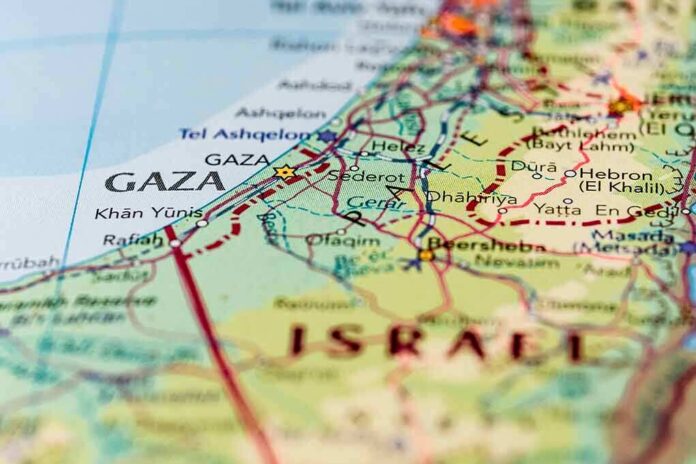
At a Glance
- President Joe Biden ordered construction of a temporary pier to deliver humanitarian aid to Gaza despite concerns from USAID staffers
- Aid groups withdrew from the project by July due to weather and security issues
- USAID staff expressed concerns that the focus on JLOTS would detract from advocating for land crossings
- The project aimed to feed 1.5 million people for 90 days but only managed to feed 450,000 people for a month
- The U.S. failed to honor commitments made with the World Food Program regarding the pier’s location and security
Controversial Aid Project
The Biden administration faces sharp criticism for a $230 million aid package aimed at building a pier in Gaza. This project, known as the Joint Logistics Over-the-Shore system (JLOTS), was expected to assist in delivering humanitarian aid despite numerous objections from USAID staffers. The $230 million project was operational for about 20 days but faced severe challenges from the outset.
Aid groups, citing weather and security issues, withdrew their participation by July 2024. Concerns loomed large over the practicality and security risks associated with the project. According to USAID staff, the major focus on JLOTS reduced advocacy efforts for opening land crossings, seen as more efficient methods of transporting aid into Gaza.
The United States Agency for International Development on Tuesday published its report into Pres. Biden’s troubled aid pier in the Gaza Strip, blaming a combination of weather and security challenges for its failures. https://t.co/xNfSFSF5AR
— ABC News Politics (@ABCPolitics) August 28, 2024
Execution and Outcomes
The idea behind the pier was to feed 1.5 million people for 90 days. However, it only managed to feed 450,000 people for a month, falling significantly short of its goal. High waves and bad weather repeatedly damaged the pier, rendering it ineffective. The logistical challenges combined with the harsh weather conditions rendered the pier less useful, leading to discontent and backlash from various quarters.
USAID addressed these issues by adding enough staffing to manage both pier and land routes simultaneously. Despite these efforts, the pier only managed to deliver 8,000 metric tonnes of aid during its two-month operation. The Pentagon placed the pier in central Gaza for supposed better security, contradicting prior agreements to position it in north Gaza.
Biden pushed for failed Gaza aid pier despite warnings against it, USAID says https://t.co/y8EIHGrMDy
— The Times of Israel (@TimesofIsrael) August 28, 2024
Political Repercussions
Israel’s military provided the pier’s security after the U.S. couldn’t find a neutral country to do so. The U.N. World Food Program ceased cooperation after an Israeli rescue operation nearby raised neutrality concerns. This led to more criticism over the lack of foresight and strategic planning in the project’s implementation. The Biden administration’s pier project attracted censure for being seen as a workaround to avoid political pressure on Israel.
“Tonight, I’m directing the US military to lead an emergency mission to establish a temporary pier in the Mediterranean on the coast of Gaza that can receive large shipments carrying food, water, medicine, and temporary shelters,” Biden said. “A temporary pier will enable a massive increase in the amount of humanitarian assistance getting into Gaza every day.”
The project blurred the lines between humanitarian and military activities, presenting reputational and safety concerns for aid agencies. Nine months of Israeli military operations had already caused severe food insecurity and displacement in Gaza, adding more layers to the controversy. In the end, the US permanently shut down the floating pier project after it was deemed ineffective and as a result of continuous breakdowns.
Sources
Biden pushed Gaza pier over warning it would undercut other aid routes, watchdog says
US Gaza pier to close after costing $230m for a day’s worth of aid
Biden Pushed Gaza Pier Despite Warnings: Watchdog
Biden pushed Gaza pier over warnings it would undercut other aid routes, watchdog says
French chief rabbi sparks outrage with call for Israel to ‘finish the job’ in Gaza












